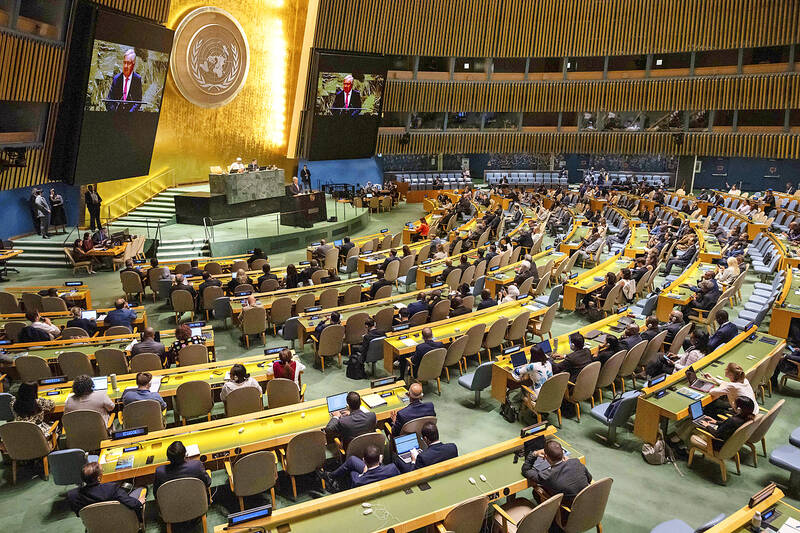Plans to pass a legislative motion clarifying Taiwan’s stance on UN Resolution 2758 might be derailed as the Chinese Nationalist Party (KMT) demurs on the issue, saying it could adversely affect cross-strait relations.
The Democratic Progressive Party, which is planning to draft a motion to address UN Resolution 2758, is hoping to gain the support of other parties, but the KMT caucus yesterday said that such a motion needs further evaluation.
China has aligned UN Resolution 2758 with its own definition of the “one China principle,” reducing Taiwan’s opportunity for participation on the world stage.

Photo: AP
However, the resolution has recently captured the attention of the international community, with the Inter-Parliamentary Alliance on China, the Australian Senate and the Dutch House of Representatives successively passing motions in support of Taiwan and seeking to clarify that the resolution does not involve Taiwan nor is it the same as China’s interpretation.
UN Resolution 2758, adopted by the UN General Assembly in 1971, recognizes the People’s Republic of China (PRC) as the “only lawful representative” of China, but it does not state that it has sovereignty over Taiwan, as Beijing has insisted.
The KMT caucus yesterday said that the DPP’s proposed motion “needs to be evaluated pragmatically.”
Rather than hastily passing such a motion, it is necessary to determine how it could potentially affect the development of cross-strait relations, including if it could raise tensions between the two sides, KMT caucus secretary-general Lin Szu-ming (林思銘) said.
Every member of the legislature loves their country and hopes to see Taiwan engage with the international community, but it is necessary to first pragmatically manage cross-strait relations, he said.
Cross-strait relations take precedence over other diplomatic ties, and only by handling them well would Taiwan have more space to participate on the world stage, he added.
Lin urged the DPP to carefully consider whether such a motion would contribute toward peaceful relations with China, rather than only helping Taiwan.
He also expressed gratitude on behalf of his party for the support from other countries.
The KMT’s response drew sharp criticism from the DPP.
“With a party like that, who needs enemies? The KMT should apologize to Taiwanese society,” DPP caucus deputy secretary-general Hung Sun-han (洪申翰) said.
DPP caucus secretary-general Rosalia Wu (吳思瑤) accused the KMT caucus of backtracking on its earlier support for the proposed motion, citing Lin’s comments when the Australian Senate passed its motion last month.
“The KMT is under pressure from whom?” she asked, in an apparent reference to China’s Taiwan Affairs Office (TAO) last week urging countries to stop supporting Taiwan and reaffirming its own interpretation linking UN Resolution 2758 and its “one China principle.”
Wu asked whether the KMT caucus had been influenced by China’s comments, and questioned whether the party is fit to partake in governing the country.
Lin’s lack of support is disappointing, DPP Legislator Tsai Yi-yu (蔡易餘) said.
While the world supports Taiwan in its hopes of clarifying UN Resolution 2758, the KMT reversed its position as soon as the TAO commented on the issue, he said, adding that the KMT preferred to follow the TAO’s lead.

SECURITY: As China is ‘reshaping’ Hong Kong’s population, Taiwan must raise the eligibility threshold for applications from Hong Kongers, Chiu Chui-cheng said When Hong Kong and Macau citizens apply for residency in Taiwan, it would be under a new category that includes a “national security observation period,” Mainland Affairs Council (MAC) Minister Chiu Chui-cheng (邱垂正) said yesterday. President William Lai (賴清德) on March 13 announced 17 strategies to counter China’s aggression toward Taiwan, including incorporating national security considerations into the review process for residency applications from Hong Kong and Macau citizens. The situation in Hong Kong is constantly changing, Chiu said to media yesterday on the sidelines of the Taipei Technology Run hosted by the Taipei Neihu Technology Park Development Association. With

CARROT AND STICK: While unrelenting in its military threats, China attracted nearly 40,000 Taiwanese to over 400 business events last year Nearly 40,000 Taiwanese last year joined industry events in China, such as conferences and trade fairs, supported by the Chinese government, a study showed yesterday, as Beijing ramps up a charm offensive toward Taipei alongside military pressure. China has long taken a carrot-and-stick approach to Taiwan, threatening it with the prospect of military action while reaching out to those it believes are amenable to Beijing’s point of view. Taiwanese security officials are wary of what they see as Beijing’s influence campaigns to sway public opinion after Taipei and Beijing gradually resumed travel links halted by the COVID-19 pandemic, but the scale of

A US Marine Corps regiment equipped with Naval Strike Missiles (NSM) is set to participate in the upcoming Balikatan 25 exercise in the Luzon Strait, marking the system’s first-ever deployment in the Philippines. US and Philippine officials have separately confirmed that the Navy Marine Expeditionary Ship Interdiction System (NMESIS) — the mobile launch platform for the Naval Strike Missile — would take part in the joint exercise. The missiles are being deployed to “a strategic first island chain chokepoint” in the waters between Taiwan proper and the Philippines, US-based Naval News reported. “The Luzon Strait and Bashi Channel represent a critical access

Pope Francis is be laid to rest on Saturday after lying in state for three days in St Peter’s Basilica, where the faithful are expected to flock to pay their respects to history’s first Latin American pontiff. The cardinals met yesterday in the Vatican’s synod hall to chart the next steps before a conclave begins to choose Francis’ successor, as condolences poured in from around the world. According to current norms, the conclave must begin between May 5 and 10. The cardinals set the funeral for Saturday at 10am in St Peter’s Square, to be celebrated by the dean of the College